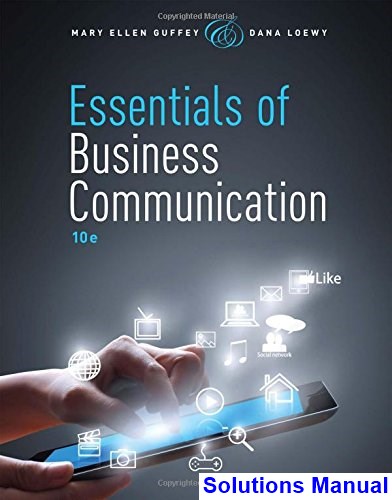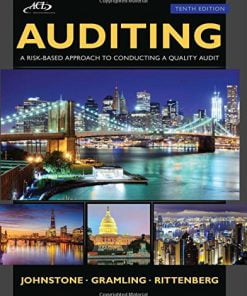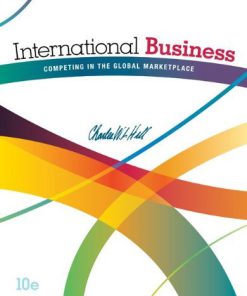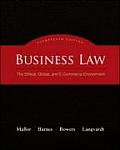Essentials of Business Communication 10th Edition Guffey Solutions Manual
$35.00 Original price was: $35.00.$26.50Current price is: $26.50.
Essentials of Business Communication 10th Edition Guffey Solutions Manual
Essentials of Business Communication 10th Edition Guffey Solutions Manual

Product details:
- ISBN-10 : 1285858891
- ISBN-13 : 978-1285858890
- Author: Mary Ellen Guffey
Strengthen your business communication skills with the streamlined presentation and unparalleled learning resources found only in the award-winning ESSENTIALS OF BUSINESS COMMUNICATION, 10E. This unique four-in-one learning package includes an authoritative text, practical workbook, grammar/mechanics handbook at the end of the book, and premium Web site (access code is included with new copies of the text). You�ll learn basic writing skills and then apply these skills to a variety of e-mails, memos, letters, reports, and resumes. Realistic, updated model documents and new exercises and activities introduce the latest business communication practices. Extraordinary exercises help you build confidence as you review grammar, punctuation, and writing guidelines. You’ll find increased coverage of professional social media communication, electronic messages and digital media. Please note that the Premium Website access code is included in new copies of the text. Access codes and supplements are not guaranteed with used items.
Table contents:
- Chapter 1: Communicating in Today’s Workplace
- 1.1 The Relationship between Solid Communication Skills and Workplace Success
- 1.2 Developing Listening Skills
- 1.3 Learning Nonverbal Communication Skills
- 1.4 Recognizing How Culture Affects Communication
- 1.5 Building Intercultural Workplace Skills
- Learning Summary
- Chapter Review
- Critical Thinking
- Activities and Cases
- Grammar/Mechanics Challenge 1
- Editing Challenge 1
- Unit 2: The Business Writing Process
- Chapter 2: Planning Your Message
- 2.1 Understanding the Communication Process
- 2.2 Using the 3-x-3 Writing Process as a Guide
- 2.3 Analyzing and Anticipating the Audience
- 2.4 Adapt to Your Audience with Expert Writing Techniques
- 2.5 Adapt to Your Audience with Additional Expert Writing Techniques
- Learning Summary
- Chapter Review
- Critical Thinking
- Activities and Cases
- Writing Improvement Exercises
- Grammar/Mechanics Challenge 2
- Editing Challenge 2
- Chapter 3: Organizing and Drafting Your Message
- 3.1 Drafting Workplace Messages
- 3.2 Organizing Information to Show Relationships
- 3.3 Drafting with Effective Sentences
- 3.4 Developing Stylish Sentences
- 3.5 Drafting Well-Organized, Effective Paragraphs
- Learning Summary
- Chapter Review
- Critical Thinking
- Activities and Cases
- Writing Improvement Exercises
- Grammar/Mechanics Challenge 3
- Editing Challenge 3
- Chapter 4: Revising Your Message
- 4.1 Taking Time to Revise
- 4.2 Making Your Message Clear
- 4.3 Enhancing Readability through Document Design
- 4.4 Proofreading to Find Errors
- 4.5 Evaluating the Effectiveness of Your Message
- Learning Summary
- Chapter Review
- Critical Thinking
- Activities and Cases
- Writing Improvement Exercises
- Grammar/Mechanics Challenge 4
- Editing Challenge 4
- Unit 3: Writing at Work
- Chapter 5: Writing Daily Messages
- 5.1 Daily Writing at Work
- 5.2 Using Communication Intention to Format Daily Messages
- 5.3 Instant Messaging and Texting at Work
- 5.4 Blogging for Business
- 5.5 Social Media for Business
- Learning Summary
- Chapter Review
- Critical Thinking
- Activities and Cases
- Writing Improvement Exercises
- Grammar/Mechanics Challenge 5
- Editing Challenge 5
- Chapter 6: Writing to Persuade
- 6.1 Persuasion in the Digital Age
- 6.2 Persuasive Intention: Help Requests
- 6.3 Persuasive Intention: Claims and Complaints
- 6.4 Persuasive Intention: Coworker and Manager Buy-In
- 6.5 Persuasive Intention: Selling and Promoting
- Learning Summary
- Chapter Review
- Critical Thinking
- Activities and Cases
- Writing Improvement Exercises
- Grammar/Mechanics Challenge 6
- Editing Challenge 6
- Chapter 7: Writing to Give Bad News
- 7.1 Why We Communicate Negative Information
- 7.2 Direct and Indirect Negative Writing Strategies
- 7.3 The Four-Part Strategy for Indirect Negative Messages
- 7.4 Writing Negative Messages for External Situations
- 7.5 Negative Messages for Internal Situations
- Learning Summary
- Chapter Review
- Critical Thinking
- Activities and Cases
- Writing Improvement Exercises
- Grammar/Mechanics Challenge 7
- Editing Challenge 7
- Unit 4: Business Reports and Proposals
- Chapter 8: Informal Reports
- 8.1 The Function and Organization of Informal Reports
- 8.2 Informal Formats and Headings
- 8.3 Determining the Problem and Purpose in Informal Reports
- 8.4 Writing Informal Informational Reports
- 8.5 Writing Informal Analytical Reports
- Learning Summary
- Chapter Review
- Critical Thinking
- Activities and Cases
- Grammar/Mechanics Challenge 8
- Editing Challenge 8
- Chapter 9: Proposals and Formal Reports
- 9.1 Writing Business Proposals
- 9.2 Writing Formal Business Reports
- 9.3 Researching Report Data
- 9.4 Documenting and Citing Sources
- 9.5 Converting Data into Meaningful Visuals
- 9.6 Sequencing the Report
- Learning Summary
- Chapter Review
- Critical Thinking
- Activities and Cases
- Grammar/Mechanics Challenge 9
- Editing Challenge 9
- Unit 5: Professionalism and Speaking Skills
- Chapter 10: Communicating Professionally in Person
- 10.1 Professionalism, Business Etiquette, and Ethical Behaviour
- 10.2 Face-to-Face Communication
- 10.3 Phone and Voice Mail Etiquette
- 10.4 Adding Value in Professional Teams
- 10.5 Conducting Professional Business Meetings
- Learning Summary
- Chapter Review
- Critical Thinking
- Activities and Cases
- Grammar/Mechanics Challenge 10
- Editing Challenge 10
- Chapter 11: Business Presentations
- 11.1 Types of Business Presentation and Preparation
- 11.2 Organizing Presentations for Impact and Rapport
- 11.3 Presentation Aids
- 11.4 Designing Effective Presentations
- 11.5 Polishing Your Delivery
- Learning Summary
- Chapter Review
- Critical Thinking
- Activities and Cases
- Grammar/Mechanics Challenge 11
- Editing Challenge 11
- Unit 6: Communicating for Employment
- Chapter 12: The Job Search, Resumes, and Cover Letters
- 12.1 Preparing for Employment
- 12.2 Searching for Jobs in the Open and Hidden Markets
- 12.3 Creating Persuasive Resumes
- 12.4 Increasing Your Chances with Digital Tools
- 12.5 Persuasive Cover Letters
- Learning Summary
- Chapter Review
- Critical Thinking
- Activities and Cases
- Grammar/Mechanics Challenge 12
- Editing Challenge 12
- Chapter 13: Interviews and Follow-Up
- 13.1 Purposes and Types of Employment Interviews
- 13.2 Before the Interview
- 13.3 During the Interview
- 13.4 After the Interview
- 13.5 Other Employment Documents
- Learning Summary
- Chapter Review
- Critical Thinking
- Activities and Cases
- Grammar/Mechanics Challenge 13
- Editing Challenge 13
- Appendix A: A Guide to Document Formats
- Appendix B: Correction Abbreviations and Proofreading Marks
- Appendix C: Documentation Formats
- Appendix D: Style in Writing
- Grammar/Mechanics Handbook
- Key to Grammar/Mechanics Chapter Challenges and Handbook Checkups
- Notes
- Index
People also search:
essentials of business communication 10th edition
essentials of business communication 10th edition answer key free
|
essentials of business communication 10th edition free download
essentials of business communication 10th canadian edition
essentials of business communication 10th canadian edition pdf free
10 characteristics of business communication
|
Related products
Solution Manual
Management Information Systems Managing the Digital Firm Laudon 14th Edition Solutions Manual
Solution Manual
Auditing A Risk Based-Approach to Conducting a Quality Audit Johnstone 10th Edition Solutions Manual
Solution Manual
International Accounting Doupnik 4th Edition Solutions Manual
Solution Manual
International Business Competing in the Global Marketplace Hill 10th Edition Solutions Manual
Solution Manual
Solution Manual











